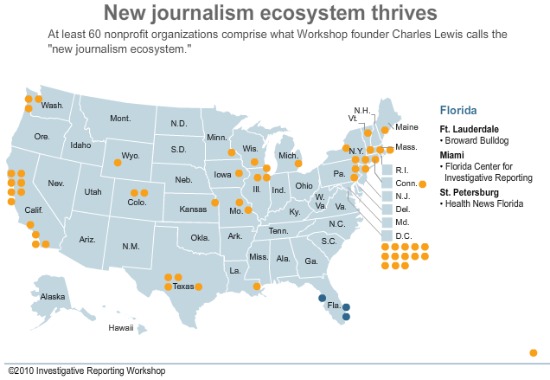Sign up for the daily CJR newsletter.
Investigative Reporting Workshop founder Charles Lewis offers a few sobering—though unfortunately unsurprising—PEJ statistics in the introduction to his latest report about the “new journalism ecosystem.” For example, from 1980 to 2005, the number of newspaper reporters covering Philadelphia fell from 500 to 220. In the same time span, the number of public relations positions in the country doubled, from 45,000 to 90,000. One of the hardest-hit subsets of the industry has been, of course, the most costly: investigative reporting.
But it’s not all bad news. As Lewis writes, “It is against this complex and noisy backdrop that a new flowering of nonprofit news organizations has arisen.” (The ProPublicas, The Voice of San Diegos, and the Texas Tribunes of the world are doing just fine, thank you very much.) With this in mind, the Investigative Reporting Workshop’s i-Lab has created a database of “the most interesting and credible nonprofit, online publishers in the United States, and in 2011, around the world.”
So far they’ve got sixty organizations, some new and some less so, but all doing impressive, important work. (Screenshot below; clickable interactive map here.)

Here are some facts about the breakdown of the sites in the Ecosystem database:
-Number of organizations profiled: 60
-Number of full-time employees within these organizations: 658
-Cumulative total of the annual budgets of these organizations: $79.7 billion
-Number of organizations that are members of the Investigative News Network: 41
-Number of organizations based at or near a university: 14 (28%)
-Number of organizations that disclose their donors on their websites: 47 (78%)
The collection is, Lewis concedes, a “motley assemblage.” Some organizations here are still in “precarious mode,” operating on annual budgets of less than $100,000, while others are well-established and flush with foundation cash. Veterans like Mother Jones are included, but so is the kicky young New Orleans startup The Lens. For reasons of simplification, the database excluded NPR and PBS outfits, but it also included groups like the Center for Responsive Politics and the National Security Archive, which primarily publish the raw research that facilitates investigations. The database is fluid, though, and will be continuously updated in the future.
CJR is set to launch our own database of online news startups soon on The News Frontier page of CJR.org. Stay tuned….
Has America ever needed a media defender more than now? Help us by joining CJR today.





